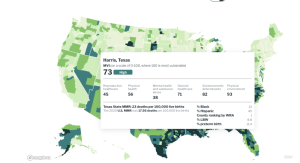A new study suggests coronavirus symptoms felt in the first week of infection may be a predictor of how long they will last.
Patients with COVID-19 who felt more than five symptoms in their first week of illness were more likely to become a “COVID-19 long hauler,” which researchers qualified as having symptoms for longer than 28 days, according to the study published Wednesday in the peer-reviewed journal Nature Medicine.
The five symptoms experienced during the first week that were most predictive of becoming a long hauler were fatigue, headache, hoarse voice, muscle pain, and difficulty breathing.
Researchers from King’s College London, Massachusetts General Hospital, and Boston Children’s Hospital asked COVID-19 patients from the U.K., U.S., and Sweden to report their symptoms through a smartphone application from March to September 2020.
Out of more than 4,000 participants, about 13% of patients reported symptoms lasting more than 28 days, 4% for more than 8 weeks, and 2% for more than 12 weeks.
Out of the patients who reported symptoms for more than four weeks, “a third of those will have symptoms at 8 weeks and then a third of those at 12 weeks,” said study co-author Dr. Christina Astley, a physician-scientist at Boston Children’s Hospital. “If you think about it, 1 in 20 people who have COVID-19 will have symptoms lasting 8 weeks or more.”
The likelihood of having persistent symptoms was significantly associated with increasing age, rising from 9.9% of individuals 18 to 49, to 21.9% in those above 70. Anosmia, or the loss of smell, was the most common symptom in older age groups.
While the study attempted to identify risk factors and markers that may indicate long COVID-19, doctors are finding it can happen to anyone at any age, said Dr. Michael Wechsler, a pulmonologist at National Jewish Health.
“It can happen in any age group, but it’s most alarming to younger people who are otherwise healthy and not used to these symptoms,” he said.
The study found two main patterns among study participants. One group of COVID-19 long haulers exclusively reported fatigue, headache, and upper respiratory issues, such as shortness of breath, sore throat, cough and loss of smell. However, the second group of long haulers had persistent multi-system complaints, such as a fever or gastrointestinal symptoms.
Weschler sees a wide array of symptoms in the clinic that caters to COVID-19 long haulers at National Jewish Health. Similar clinics have popped up in hospitals across the country to accommodate the growing number of COVID-19 patients who report symptoms months after recovery.
“Long COVID is common. It affects a large proportion of patients and has a wide distribution of symptoms,” he said. “It’s important to make people aware that all these different side effects and symptoms can occur.”
The study comes a few weeks after Dr. Anthony Fauci announced the U.S. government was launching a nationwide initiative to study long COVID-19, which he called Post Acute Sequelae of SARS-CoV-2 (PASC).
A study published in JAMA Network Open on Feb. 19 found that about 30% of COVID-19 patients reported persistent symptoms as long as nine months after the illness.
“(There are) a lot of important questions that are now unanswered that we hope with this series of initiatives we will ultimately answer,” he said during a White House briefing on Feb. 24.
“A lot of attention has been paid to morbidity and mortality associated with COVID and that drove a lot of modeling and decision making,” she said. “But now that more and more of the population has had exposure and infection with COVID, this more chronic aspect of COVID becomes more important.
Source: www.usatoday.com









